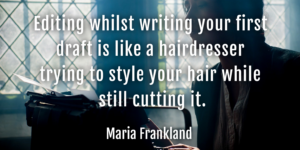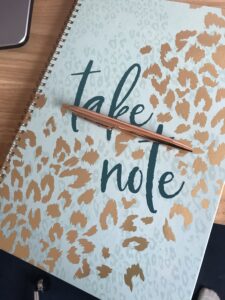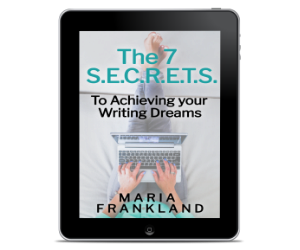Write, THEN edit!
Hi there and welcome to May’s Writerly Witterings. This month I’m going to talk about resisting the urge to edit whilst you're still writing. This will include the offering of some editing activities you can try.
Whether you're working on a poem, a short story or a longer piece of work, such as a novel, it's vital that you get to the end of your first draft before trying to improve anything.
Here’s why:
- If you stop to edit what you've already written, you risk losing your writing momentum.
- You're more likely to get stuck part way through – writing a draft is wonderful and you need to keep going forwards, not backwards.
- Evidence suggests that the creative process and the editing process use entirely different sides of your brain. Right for creation and left for editing. Therefore you'll gain maximum benefit from focusing on one job at a time.
- The first draft is just you – telling the story to yourself. Therefore tell it – don’t stop!
- Continuously picking up a draft and putting it down can result in it becoming disjointed and losing its tone and voice.
Remember, you can’t edit a blank page. You need a rough story or poem in its entirely – then you have your gem which you can polish into the precious jewel it will become…

Imagine you sit down with your laptop or notebook…
You’ve got a great idea for a story. At this stage you’re not sure how long it could grow to but you’ve jotted down a few notes about the beginning and a few plot points. You’ve got to know your two main characters in some depth and can’t wait to get started.
You write the words chapter one and you’re off…
For the first two days, the words tumble out of you and you’re on a roll. On day three, you decide to read back through what you’ve already written. You know this is good practice to help re-establish yourself within your story, but then you start tinkering around with what you’ve already written. You delete things, then put them back. You swap things around and correct all your spelling and punctuation. You stare at your first paragraph, wondering if it has a strong enough hook for your reader until your eyes are sore.
Before you know it, two hours have sped by and you’ve got other responsibilities to attend to. You’ll carry on writing tomorrow…
But tomorrow, you don’t manage to sit down again. Or the next day. Six days after typing the words Chapter One, you sit down again to write. Because your characters and story are fading, it’s necessary to re-read what you’ve written. And again, you can’t help but tinker.
You force yourself after half an hour to leave the editing and move on with your story. You re-read your notes. You stare at your page then type a couple of lines. Then delete them. You feel stuck. Where has your story gone?

Going forwards and forwards and forwards takes away some of the risk of getting stuck. Even if you only move forwards by a few hundred words at a time. Or even a few sentences. Just resist the urge to edit until that first draft is complete.
So assuming you have a COMPLETE first draft piece, here are some editing activities:
If you don’t have a first draft to work with, click here to download a FREE booklet full of writing prompts.
- Does your work have structure? A compelling opening, an inciting incident, rising action with peaks and troughs, a climax and a resolution.
- Will your readers care? That’s the crux of any piece of writing. It’s all about evoking feeling and emotion.
- Do a search on all the pesky words like just, so, very, that and really. Or phrases like ‘started to’ or ‘a bit.’ Delete them and your work will be stronger.
- Root out all clichés, overused phrases and instances of repetition or inconsistencies.
- Print your work. You’ll notice things on the page which you didn’t see on screen.
- Read it aloud. This is particularly important for dialogue.
- Check everywhere that you’ve shown, rather than told – for example, don’t talk about the ‘short’ woman – instead have her using a stool to reach for something.
- Whilst we’re on the subject of adjectives, use them sparingly and never use two together.
- It’s the same for adverbs – you’re often best to lose the adverb and use a stronger verb instead.
- Proof read – and if you can, get someone else to read it too. A fresh pair of eyes will spot things you haven’t.
You will ultimately find your own planning-creation-editing-polishing process and I’d love to hear what works for you so do post into the comments to let me know.
My latest free course on YouTube, Write 10 Stories in 30 Days, offers the chance for you to work in ten different genres, supporting you through the start to end process. You won’t be invited to edit until your first draft is complete and there’s lots of advice about this. Click below for day one.
And if you are interested in giving yourself a bigger writing project, throughout May, any writer who begins one of my year-long online courses will get a complimentary A4 hardback writing book and gold pen. (Not real gold, unfortunately!)
You can try a free first session by messaging me your email address and requesting novel, poetry, life story or short story - or follow this link for more course info.

Enjoy the rest of your writing month and I’ll see you next time. I release a blog post on the 8th of every month.
Bye for now.
With very best wishes,
Maria
PS: This blog post is also available as a YouTube video
GET A FREE BOOK!
Click below to join my 'keep in touch' list and receive your FREE copy of 'The 7 S.E.C.R.E.T.S. to Achieving your Writing Dreams.
